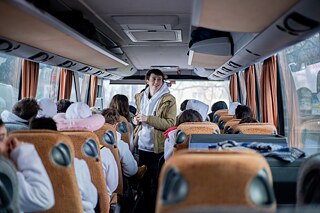Generation 14plus
"Ha’Mishlahat" (The Delegation)

"The Delegation", or "Ha'Mishlahat" in its original language, is one of the 17 films in the "Generation 14plus" category presented at Berlinale 2023 and had its world premiere at the same festival.
By Maya Chesnay
Written and directed by Asaf Saban, an Israeli director, this coming of age film combined with the road movie genre features three young high school teenagers, Frisch (Yaov Bavly), Nitzan (Neomi Harari) and Ido (Leib Levin) during a trip where the young people visit several places in Poland that are connected with the Holocaust and World War II.
question their own identity
Together with a group of Israeli youth, their teacher and a Holocaust survivor, Frisch, Nitzan and Ido travel through Poland to learn more about those who came before them. Throughout this tour, which almost every young Israeli makes in his or her lifetime, they visit former concentration camps and Holocaust memorial sites. These visits make them question their own identity as Jews and create some tension in the group. And then, as on any youth trip, every relationship is intensified, which creates even more tension in the small group of friends formed by Frisch, Nitzan and Ido. During the course of the journey, they, as well, are forced to question their identity in different ways. They will also have to overcome several obstacles.Another actor who impressed me with his performance was Ezra Dagan, as Yosef, a Holocaust survivor. Although he didn't have as much screen time as the two young people, every time he came on stage he executed his lines fluidly and in a natural way. The majority of the time, Yosef's character is trying to tell his story as a concentration camp survivor, but every time he is about to start his story, something distracts him or he gets lost in his facts. There is also a moment when the group is traveling on the bus and the guide asks the grandfather if he can continue his story so as not to lose too much time when they get to their next stop. The character of Yosef seems to be caught up in mixed emotions of sadness and ignorance, which Ezra Dagan presents in a balanced way. And then, in general, the actor knows how to stand out despite his age difference and his short, but touching scenes.
A quest to find themselves
The development of the story is really interesting during the whole movie. From the beginning to the end, there is no dull moment, because there is always something interesting happening, whether it is a sad moment or a festive moment. From the beginning, the characters are presented in a clear way: the young people collect their luggage from the airport and we can already see that even if it is a trip where they will face places with a gloomy atmosphere, they will not let the little moments of madness and "silliness" pass. And during their journey, there is a motif that always comes up in the story. In fact, you could say that this cycle begins when the group arrives at one of the historical places, like, for example, the first cemetery they visit. They arrive at this place filled with history, which shocks and where each young person is in silence, until the moment when they separate to explore. There is then a bonding moment between Frisch and Nitzan, followed by the group's return to the bus. The next step in this cycle would be for the class to debrief about how they felt during their visit.The last step is then the time when the kids can enjoy their youth and be themselves, running through the hallways, hiding in the bathroom from the teacher, etc. In short, this cycle shows that even though these young people are on a journey to learn about the harsh history of the Jews, they still need to let off steam and let their heads go from time to time. And even though the characters part ways in many different ways, they have all accomplished, or at least begun, this quest to find themselves through their ancestors.
For me, this film was in my top 3 of all the films I saw at the Berlinale. I had no knowledge of these delegations of young people who go to Poland to learn about what their grandparents went through. I thought the quality of the acting and the film in general was impeccable. And then, being about the same age as the characters in the story, I thought that their quest to find themselves really resonated with what I'm experiencing. Even though these kids are Israeli and Jewish, everything they are going through can be experienced by thousands of kids all over the world. I think that's really one of the strongest points of this film.
"Generation"
Generation Kplus and Generation 14plus, two competition programmes screening state-of-the-art international cinema. For young audiences and for everyone else. Epic narratives and fleeting moments, flights of fantasy and bitter realities. Coming-of-age stories: awesome, wild and angry, heartfelt and headstrong.
With a comprehensive programme of contemporary films exploring the lives and worlds of children and teenagers, Berlinale Generation enjoys a unique position as the instigator of a convention-breaking young people’s cinema. Generation presents the type of cinema that seeks to challenge without overwhelming, nurturing an open and controversial dialogue with its audience, artists, industry guests and film critics.
The selection focuses on films that, in their narratives and cinematic languages, take young people seriously. Stories that are told through the eyes of their young protagonists and which make their worlds tangible. Films that matter, that open doors to unfamiliar worlds. Films that demand bravery, displaying intersectional perspectives and encouraging collective solutions. Films that hold up a mirror to the adult world. Feature films, documentaries and animations, genre films and works that expand the formal language of cinema compete on an equal footing in the section’s two competitions.


